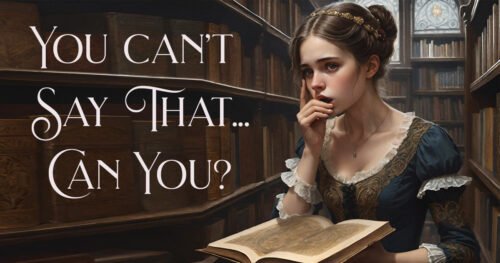You can’t say that~Stealing thunder

We’ve all had someone try to take center-stage from us when we really deserve to be there. My best example of it was when I was in active labor with Son the Third and a family member I didn’t want there walked into the hospital room and demanded all the staff pay attention to her. Just a wee bit memorable, that. And it’s a great example of stealing someone’s thunder (pre-empting the attention or praise from someone else, or using their idea for your own advantage).
But where does the expression come from?
To most normal people it doesn’t really matter, but since I write historical fantasy, I try to at least keep things consistent with the period I’m writing is. So, I often wonder if it’s okay for my characters to use a particular phrase. Could Rebecca or David talk about stealing in the World Wrights series?
Turns out they could, and here’s why:
The expression comes from the theater world of the early 1700s. John Dennis, an English playwright, was trying to make a splash with his tragedy Appius and Virginia in 1709. The play itself was nothing special (audiences weren’t exactly lining up to weep at the doors), but Dennis had a stroke of genius. He invented a new method of creating stage thunder.
Before Dennis, stage thunder usually meant rolling a cannonball across the floor backstage or shaking a substantial sheet of metal. Effective, but not terribly convincing. (Ok, admit it, you just pictured trying to roll a cannonball across the floor and having in roll right onto the stage, didn’t you?)
In any case, Dennis designed a contraption that made a much better rumbling sound—more like real thunder. He was proud of it, and rightfully so. If he’d had a patent lawyer in the family, history might have gone differently. Unfortunately for Dennis, his play flopped; closed after a few performances; forgotten by most.
But the thunder? Oh, the thunder was just getting started.
Not long after the failure of Appius and Virginia at the Drury Lane Theatre, Dennis attended a performance of Macbeth at the same theater and heard his own thunder effect being used to liven up Shakespeare’s drama. The theater crew had repurposed his invention. Furious, he stood up and shouted: “They will not let my play run, but they steal my thunder!”
And there it is. A grumpy playwright, cheated out of both applause and intellectual property, gave us a phrase that has survived for over 300 years. Definitely suitable for a Victorian setting!
References
Tearle, Oliver. 2020. “The Curious Origins of the Phrase ‘Steal My Thunder’.” Interesting Literature, August 5, 2020. Accessed August 2, 2025.
https://interestingliterature.com/2020/08/steal-my-thunder-phrase-origin/
Tréguer, Pascal. 2017. “Meaning and Origin of ‘Stealing Someone’s Thunder’.” wordhistories.net, March 22, 2017. Accessed August 2, 2025.
https://wordhistories.net/2017/03/22/to-steal-someones-thunder/

Interesting. Language is such an alive thing, isn’t it? Loved the post!